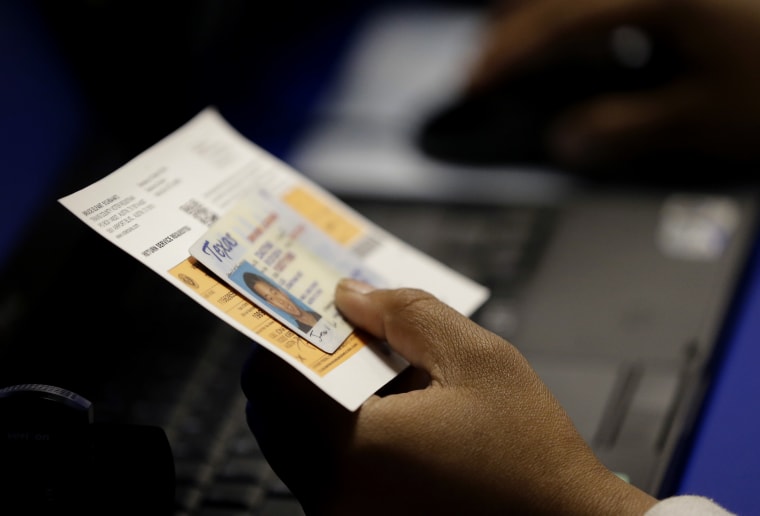A U.S. Appeals Court has ruled to put Texas's strict voter ID law back in place for the upcoming election.
Gerry Hebert, a lawyer for the plaintiffs challenging the measure, said in response that they would appeal the ruling. "We are going to the U.S. Supreme Court," Hebert said via email.
RELATED: Texas voter ID law struck down, Wisconsin's blocked
A three-judge panel of the 5th Circuit Court of Appeals on Tuesday afternoon unanimously stayed an order issued Saturday by U.S. District Court Judge Nelva Gonzales Ramos that had blocked the controversial law. Gonzales Ramos last week struck down the law, finding that it discriminates against racial minorities under the Voting Rights Act.
“Based primarily on the extremely fast-approaching election date, we STAY the district court’s judgment pending appeal,” Judge Edith Brown Clement, an appointee of President George W. Bush, wrote. It cited Purcell v. Gonzalez, a 2006 case in which the Supreme Court stopped an Arizona voting law from going into effect close to an election, to avoid causing confusion among voters.
The Supreme Court recently blocked Wisconsin’s voter ID law from taking effect, apparently based on similar grounds.
In addition to Clement, the other two judges were Katharina Haynes, also an appointee of President George W. Bush, and Greg Costa, an appointee of President Obama. Costa wrote a separate concurrence making clear that his decision was on narrow Purcell grounds.
More than 600,000 Texas voters, disproportionately minorities, don’t have the kind of ID required under the law.
“The Supreme Court must stand up for voters and block this harsh photo ID requirement,” said Myrna Pérez, deputy director of the Democracy Program at the Brennan Center. “This discriminatory law will make it harder for hundreds of thousands of voters, many of whom are minorities, to make their voices heard this November.”
RELATED: Restrict voting rights? Not on comedian Lewis Black's watch
Justin Levitt, an election law scholar at Loyola Law School, said the ruling shows a "foolish consistency" in its application of Purcell.
"The panel is particularly concerned about inconsistent application of the new ID rule if the district court’s opinion is allowed to take effect," Levitt wrote online. "That is, the court is concerned that some pollworkers may demand the restricted set of ID documents in the new law (preventing some individuals without the narrow set of ID from voting anything other than a provisional ballot), and some pollworkers may demand the less restricted set of the old law."
Levitt said that logic boils down to this: "If we let the district court’s order stand, some people without the right ID will be able to vote, and some won’t. And if we stay the district court, all people without the right ID won’t be able to vote. And in elections, 'all' is better than 'some.'"
RELATED: Voter registration spikes in Texas's largest counties
Attorney General Greg Abbott, whose office defended the law, called the ruling a "victory." As he runs for Texas governor, Abbott, a Republican, has put his support for the law front and center.
Abbott's opponent, Democrat Wendy Davis, responded: "It's deeply disturbing that Greg Abbott would call a law the court said is intentionally discriminatory against African-Americans and Hispanics a 'victory.' As the court further said, it's nothing more than a 'poll tax', which means democracy and all Texans lose."
